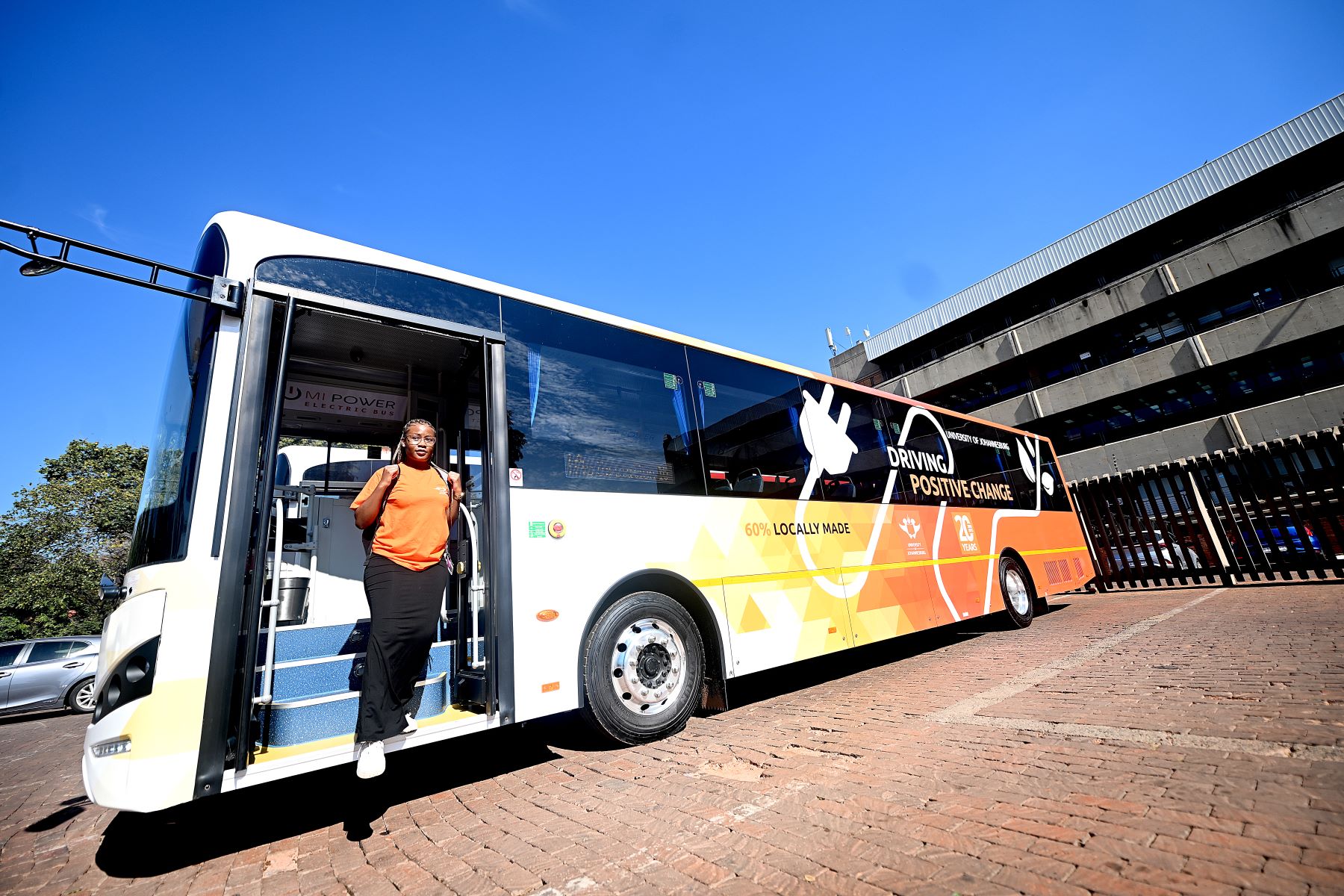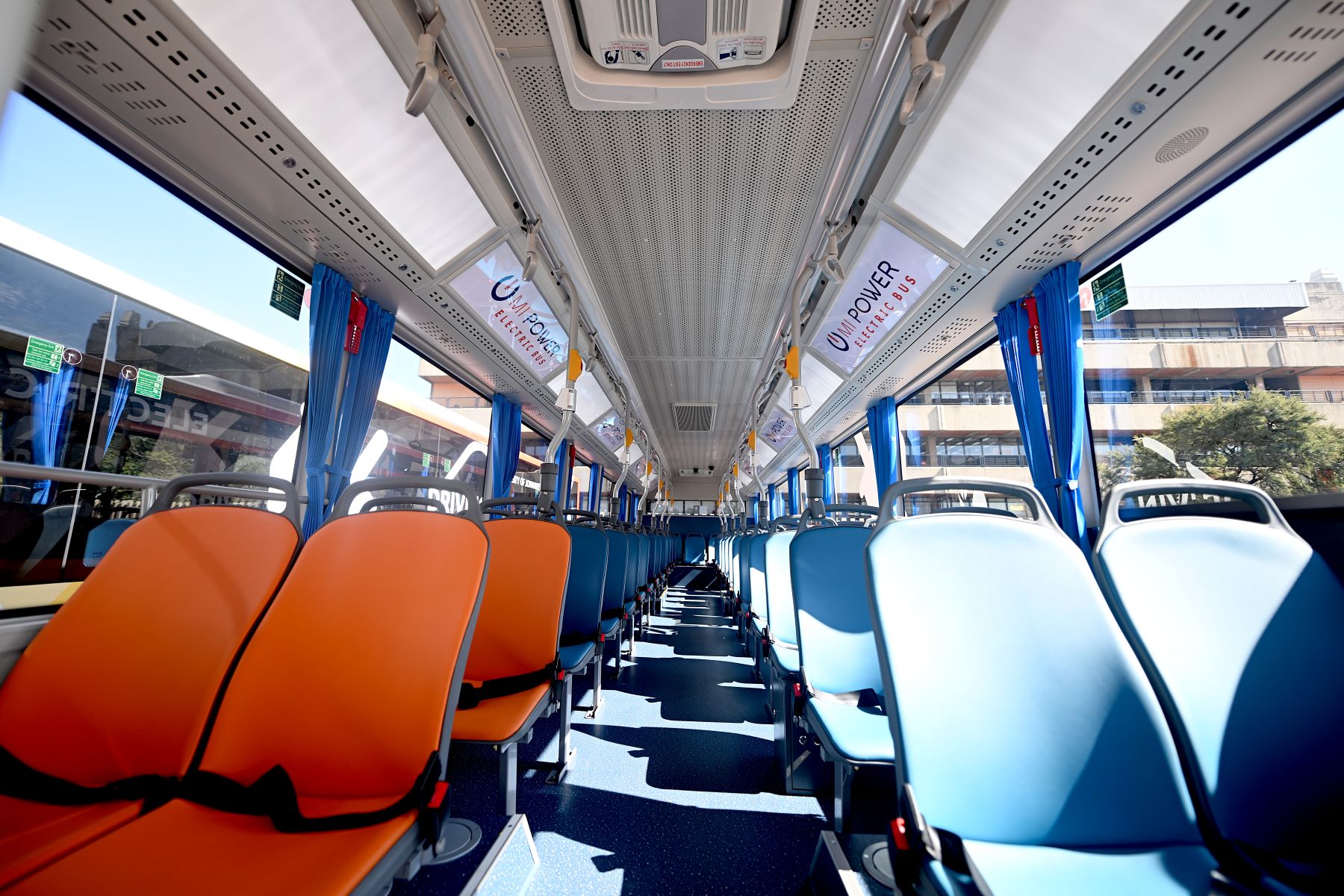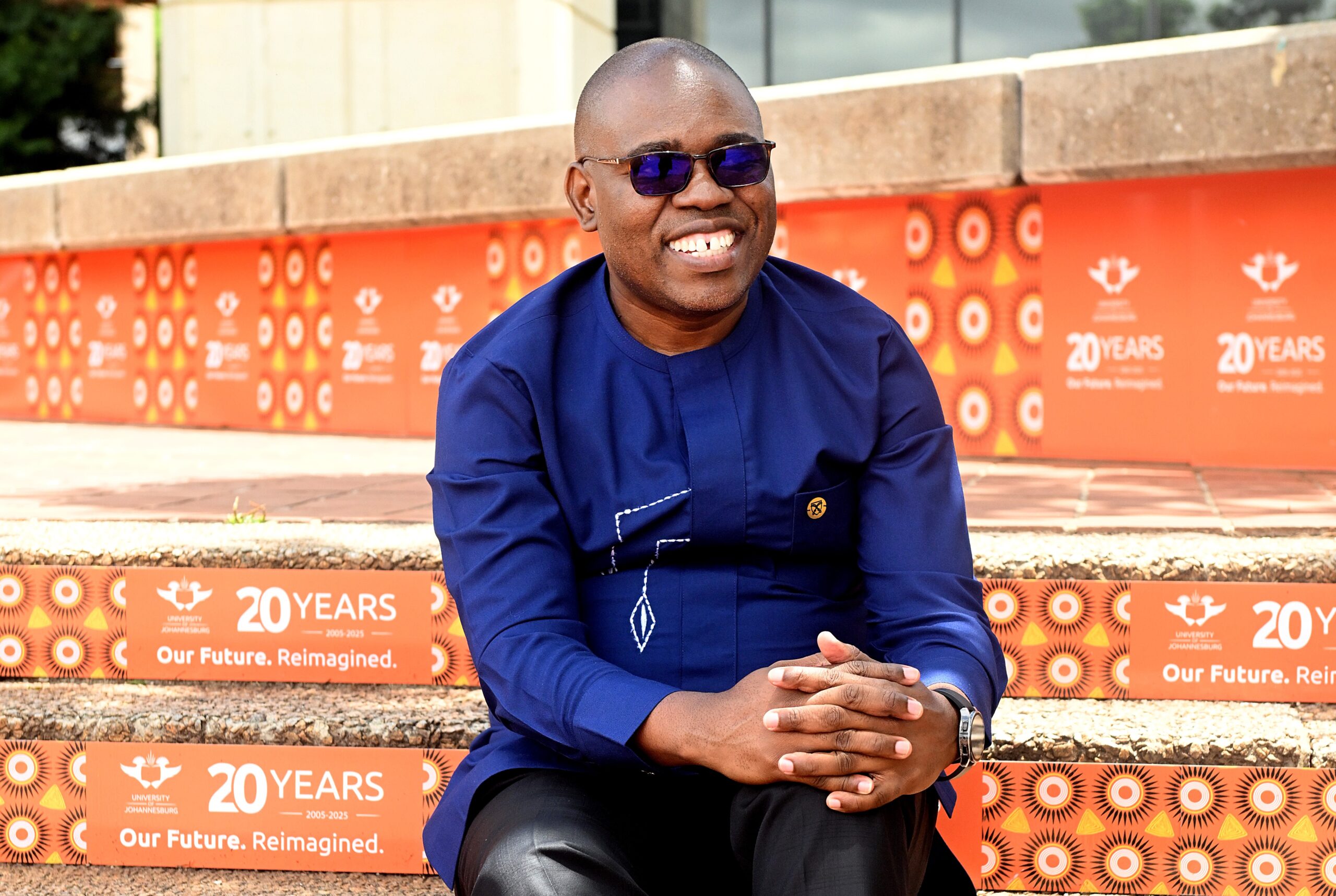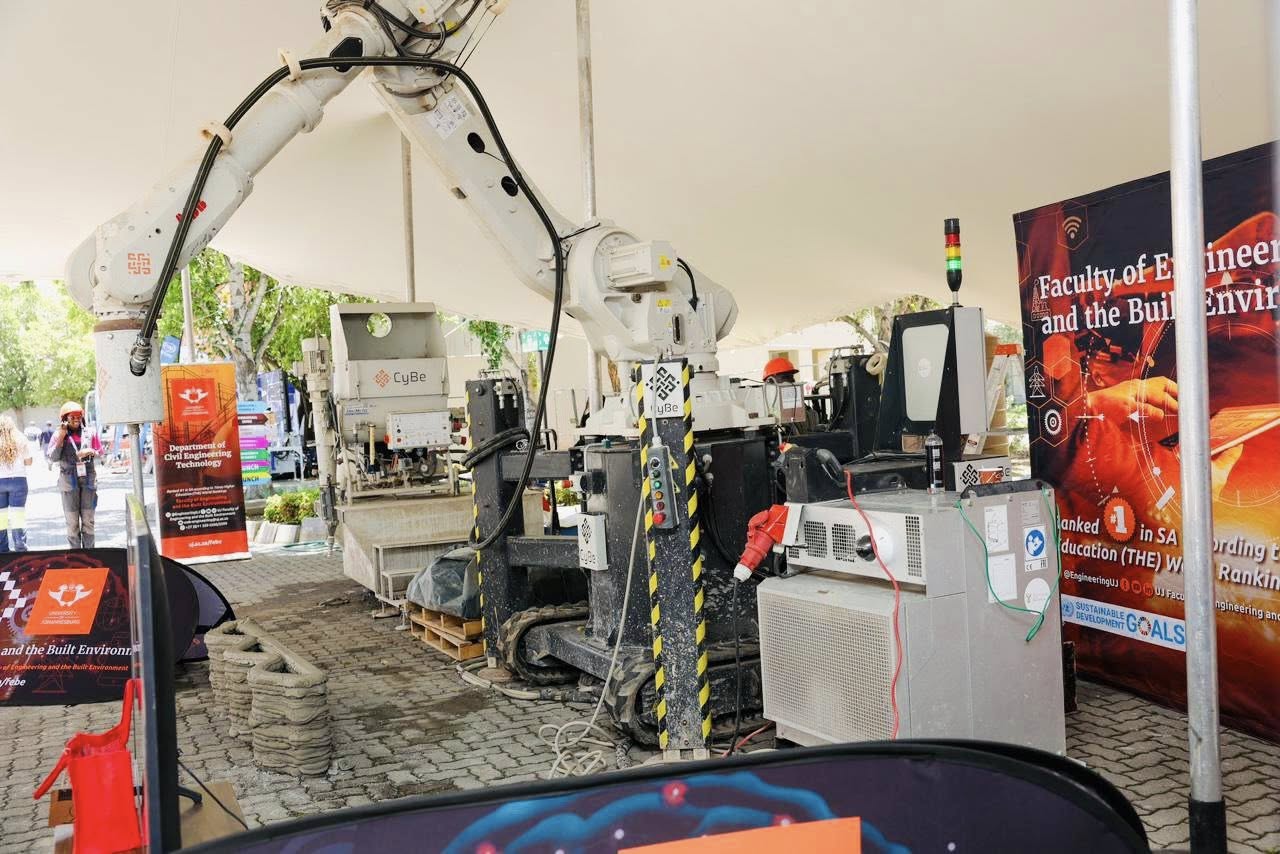SEVENTEEN electric buses in 2028 – replacing the current diesel fleet. It might seem a fairytale, but the University of Johannesburg (UJ) is on course to transform its inter-campus buses into a high-tech, environmentally friendly transport system. This is as the University ramps up its ambitious plans to contribute towards making South Africa a green economy through a reduction of carbon emissions and a lower reliance on fossil fuels, in line with the United Nations (UN) Sustainable Development Goals (SDGs).

On Friday, 16 May 2025, the University unveiled two more brand new electric buses to ferry students between its four campuses. This brought to five the number of its Electric Vehicle (EV) buses. UJ had in 2023 acquired three new electric buses, a development that was a first for any South African University. The University will in the next three years (2026 – 2028) acquire 12 more buses, with four procured each year. This will see the current diesel fleet being completely phased out.
Students at the Auckland Park boarded one of the two brand new buses branded with the bright orange UJ colours. The students could not hide their excitement with the bus ride. Unlike the normal diesel-powered engine buses, the EV buses are almost silent – with the loudest sound being the humming of the air conditioning system. Not only do the EV buses produce much lower carbon emissions, but they also perform well, offering a smooth and comfortable ride even on steep routes.
High-tech, enhanced safety and a comfortable ride
Also impressive is that the buses are equipped with USB charging ports so that students can keep their gadgets running while onboard, for convenience. For added safety, the buses are fitted with closed circuit television (CCTV) cameras and stop buttons. Adding to the high-tech design are stop buttons that make communication with operators easier, as passengers can draw the driver’s attention without being intrusive when approaching their destination. In terms of capacity, the buses can ferry 57 students seated and 19 standing.
There was excitement all around as the students boarded one of the brand-new buses before it made its way out of the campus and glided through the suburb towards the nearby Auckland Park Bunting (ABP) Campus past the SABC headquarters.
“I love this new bus, it’s so great and the ride is so smooth,” said Melissa Diale, a third- year student. “As an electrical engineering student myself, I am impressed by its features. It’s clear that UJ strives for a sustainable community in the truest sense of the word.” Said Cebukuthula Zungi, a Sociology Honours student: “These buses are truly a signature UJ project. The sleek appearance, added with the orange and hoopoe on the side of the buses [UJ Emblem] adds to the overall experience. I have been in one of the electric buses before and the commute was quieter and an enjoyable experience. I’m not used to the bus being so quiet on the road. I think electric buses are an amazing idea and them being environmentally friendly is great.”

Also aboard the bus was Professor Letlhokwa Mpedi, UJ Vice-Chancellor and Principal, and Prof Bongani Ngqulunga, Senior Executive Director: University Relations, Student Affairs and UJ Sport. “This is amazing, isn’t it? How I wish I was a student,” said Mpedi, recalling his early schooldays at university, when he used to travel by the Shosholoza Myl trains. “I remember we used to do the final reading on our way to write a test on the train. It wasn’t a pleasant experience at all. But these buses are safe and comfortable. Once you step inside, you feel all the ambience. Most importantly, they are great for sustainability in the broader sense, in terms of environmental friendliness. They are also good for investment and financial sustainability.”
Proudly manufactured in South Africa
The electric buses have become a common sight between UJ’s campuses. “Our buses are running day in, day out, ensuring that our students are never late for lectures,” said Dr Mpoti Ralephata, UJ’s Chief Executive Officer, adding that they are more reliable and cost effective. “The three that we acquired in 2023 have now done over 100 000kms. That’s quite a big mileage in two-and-a-half years. But that is nothing but a number, considering that the buses run on batteries with a lifespan of up to 15 years. So, we now know with certainty the operating characteristics of theses buses,”

Dr Ralephata said the buses are a demonstration that UJ is on a mission to contribute to the green economy. “We’ve a clear programme in terms of replacing the diesel buses. Next year we are going to order four buses, if all goes well,” adding that the only obstacle to achieving the target could be the availability of batteries. “Remember that the important part of this project is the batteries, which are procured abroad. The rest is 60% local content. So, we are hoping that this international scene with tariffs is not going to impact us and that we will still be able to source those batteries at a competitive rate.” This was in reference to the ongoing trade war between the USA and China.
However, even with that, Dr Ralephata is not fazed. “We we’ve no reason to believe it won’t happen [meeting targets] because we’re not in a trade war with China. Then we can procure four next year, another four in the two years afterwards to top up whatever is required. So, in four-years’ time, we should be able to meet the target for replacing our diesel inter-campus buses with electric ones.”
Low maintenance and cost-effective, with a long lifespan
The buses can cover a distance of up to 400km before they can be recharged. Currently, they use the local Starbus terminals as a charging point, but the plan is to build a power plant on campus. “We have already embarked on plans to increase our solar capacity so that we can compensate for all the Eskom power that we’re using at the moment to charge the buses.
Related: UJ unveils electric buses- a first for a South African university
Another positive aspect about the electric buses is their maintenance. “If you look at the maintenance profile of these buses, they’re very low maintenance. They are very competitive as compared to the diesel ones. For instance, the electric bus costs just over R1 a kilometre to run, while the diesel bus costs just over R12 a kilometre. So, there’s a huge difference and a lot of value in investment. It’s not only the positive impact of the carbon reduction, but there is also a big financial impact if you look at it as a package. The electric buses cost less to run, they cost less to maintain, while they impact the environment with less carbon emissions, providing a much more friendly environment for students and the community with less noise pollution. This is positive for the University, a good value proposition which shows the resilience of the University.”
UJ’s contribution to the green economy
Dr Ralephata said the buses are part of a UJ’s grand plan to move towards a green economy. The University has already embarked on erecting solar power across its campuses. “We have a well-defined programme of carbon reduction that will reach its climax somewhere between 2040 and 2050, when we achieve net zero,” he said, explaining that the target is because the project is currently linked to Eskom. “More than 80% of our carbon emissions are because of using Eskom electricity.
“So, when one says I will reach net zero by 2050, one of two things must happen. Either Eskom itself needs to reach net zero before you, or you need to find a more sustainable source of energy for that, than the current Eskom source of energy, which is coal generated at large. We believe that Eskom will move towards renewables, there’s no question about it. So, for us to get to net zero by 2050, it’s a multi-pronged approach. Ours is a realistic target, from our own perspective. So, the reduction of emissions from the electric buses is small compared to what we want to achieve. But the fact that it’s small doesn’t mean that it’s not important. It is making its own contribution.
Also impressed with the buses is Prof Ngqulunga: “As you know, one of the University’s competences of our Strategic Plan 2035 is sustainability, and this is one way in which we are contributing towards environmental sustainability. As an MEC member responsible for student affairs, I am very excited about these buses. It means our students can move from one campus to the other more comfortably and safely. To have more of these buses in a year when the University is celebrating 20 years says a lot about the university’s vision.”
Amidst the chatter and laughter from students, the buses reached their destination at APK Campus, and it was time for the students to disembark. For a while, some of the passengers remained seated, and had to be reminded that they needed to alight. Said Prof Mpedi: “My wish is that others can really emulate UJ so we can work together in addressing challenges such as global warming and with contributions like this. Of course, I’m not suggesting that buses alone will address that because there are bigger challenges we are facing in terms of environmental degradation and so on. But I strongly believe that initiatives like this contribute in their own small way.”



